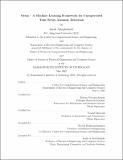Orion – A Machine Learning Framework for Unsupervised Time Series Anomaly Detection
Author(s)
Alnegheimish, Sarah
DownloadThesis PDF (4.785Mb)
Advisor
Veeramachaneni, Kalyan
Marzouk, Youssef
Terms of use
Metadata
Show full item recordAbstract
With the recent proliferation of temporal observation data comes an increasing demand for time series anomaly detection. New methods to detect anomalies using machine learning are continuously emerging. However, algorithms alone only solve one aspect of the problem – finding anomalies. Existing systems often fail to encompass an end-to-end detection process, to facilitate comparative analysis of various anomaly detection methods, or to incorporate human knowledge to refine output. This precludes current methods from being used in real-world settings by practitioners who are not machine learning experts.
In this thesis, we introduce Orion, a machine learning framework for unsupervised time series anomaly detection. The framework supports all the steps of the anomaly detection process. It includes a pipeline hub to maintain many state-of-the-art approaches for time series anomaly detection including statistical and machine learning based methods. Orion logs the entire anomaly detection journey, providing detailed documentation of the status of a signal and anomalies over time. It enables users to analyze signals, compare methods, and investigate anomalies through an interactive visualization tool, where they can annotate events by modifying existing events, creating new ones, and removing them. Using these annotations, the framework aims to leverage human knowledge to improve the performance of the pipeline. We demonstrate the effectiveness and efficiency of Orion through a series of experiments from benchmarking to AutoML on three public time series datasets: NASA, Yahoo, and Numenta. In addition, we showcase the usability of our framework through a study conducted on a real-world use case involving spacecraft experts tasked with anomaly analysis tasks. Orion’s framework, code, and datasets are open-sourced at https://github.com/sintel-dev/Orion.
Date issued
2022-05Department
Massachusetts Institute of Technology. Department of Electrical Engineering and Computer Science; Massachusetts Institute of Technology. Center for Computational Science and EngineeringPublisher
Massachusetts Institute of Technology